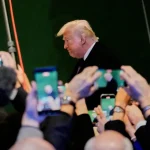
The Biden administration announced Wednesday that it has sanctioned three Sinaloa Cartel members involved in the trafficking of illicit fentanyl into the United States — including one gangster dubbed “the Anthrax Monkey.”
The Treasury’s Office of Foreign Assets Control announced the sanctioning of three men, who are alleged to be involved in the trafficking of fentanyl — which is primarily created in Mexico and smuggled across the U.S. border. It is tied to over 70,000 overdose deaths a year in the U.S.
In a release, the Treasury said that two of the men worked as “plaza bosses” to manage operations in Tijuana, Mexico, and the surrounding areas and were involved in smuggling large quantities of drugs into the U.S. — as well as being involved in kidnappings and executions.

A Mexican soldier stands guard next to some graffitis of the drug trafficker Mayo Zambada (MZ) and the criminal group “Cartel de Sinaloa” (CDS), in Palmas Altas village, Jerez de Garcia Salinas municipality, Zacatecas state, Mexico, on March 14, 2022. (PEDRO PARDO/AFP via Getty Images)
Also designated was Rafael Guadalupe Felix Nunez, who started as a hitman for the cartel and was part of an armed wing known as “Los Antrax.” Felix Nunez would become known as “El Changuito Antrax” or “The Anthrax Monkey.” He escaped from a Mexican prison in 2017 and remains at large and authorities say he has become a powerful and violent carel leader in Manzanillo.
All three men have their property and interests in the U.S. blocked, and U.S. citizens are barred from having any transactions with them.
The White House noted that the latest actions mean that there have been more than 170 sanctions imposed on drug traffickers as part of a broad agenda to tackle the opioid crisis in the U.S.
MEXICAN CARTELS’ DRUG DEALINGS ‘TOP PRIORITY’ AS FENTANYL POURS ACROSS SOUTHERN BORDER, DEA SAYS
“As part of President Biden’s Unity Agenda, we have now sanctioned more than 170 drug traffickers,” White House Office of National Drug Control Policy (ONDCP) Director Dr. Rahul Gupta said in a statement. “A key driver of the overdose epidemic is drug traffickers and their profits. President Biden has made clear: we will crack down on the illicit drug supply chain at every choke point and make drug trafficking more costly at every step of the way.”
“These sanctions are coordinated closely with the Government of Mexico and will help strengthen our critical efforts to disrupt global drug trafficking, a key part of our strategy to beat the overdose epidemic and save lives. We will continue to work across all of government to hold drug traffickers accountable for killing Americans,” he said.
“Today’s action targets key individuals responsible for facilitating the illicit trafficking of deadly drugs, including fentanyl, into the United States, where it wreaks havoc on our communities,” Under Secretary of the Treasury for Terrorism and Financial Intelligence Brian Nelson said in a statement. “Treasury remains committed to leveraging our tools in support of our whole-of-government effort to aggressively target all aspects of the supply chain and starve these criminal groups of the funding they need to operate.
The majority of the sanctions — 76% — are against two cartels, Sinaloa and Jalisco New Generation, who are the primary suppliers of the drug into the U.S. Sanctions have increased by 119% over last year’s total, the White House said, and have been made possible through an executive order signed by President Biden that expanded the Treasury’s powers to sanction those involved in the drug trade.
CLICK HERE TO GET THE FOX NEWS APP
The administration has launched a global coalition to address the threat of fentanyl, including cooperation with countries like Mexico to crack down on smugglers and regulate precursor chemicals. At home, it has been expanding access to drugs to counter overdoses, and seeking additional funding from Congress to support expansion of prevention, treatment and recovery for those addicted — while also expanding the use of technology at the southern land border to detect quantities of the incoming drug.








